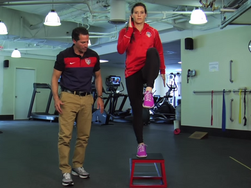Resistance Training and Running.

So I'm going to temporarily turn my attention from ACL injuries, to resistance training in runners. Or specifically, lack thereof. The reason why I'm doing it is because I'm going to lose it, if I have to hear one more time;
"Why do I always get knee pain when I run? I get massages often, and I stretch and foam roll my ITB/calf/hamstrings everyday".
To be a runner and have knee pain, ITB pain, "shin splints" or achilles tendon pain, it is no longer acceptable, and to be perfectly honest should have never been acceptable, for your injury to be a "badge of honor". With the good body of knowledge that exists regarding the benefits of resistance training in all facets of life, especially sport, it really surprises me to see an absence of a strengthening plan in my patients who are regular runners. Now I know strengthening isn't the "be-all and end-all". Poor load management/training errors, poor gait patterning (over-striding), and not being able to "run softly" are all evidence-based training errors that are getting a lot of attention of late. But poor strength, in my opinion, is also a key modifiable risk factor that needs attention too. To be fair to my runners, they are generally bloody brilliant at carefully increasing their mileage by no more than 10-15% per week. As mentioned above, they will also generally have a good flexibility program to assist their running. But in my opinion, this is not enough. In fact, stretching-alone has been shown to be ineffective in the management of both acute and overuse injuries, whereas strength-training alone has been shown to reduce overuse injuries (such as the ones listed above) by 50% (reference).
Aside from decreased overuse injury rates with strength training, two studies have shown that resistance training can improve running performance. In a systematic review and meta-analysis, it was found that the addition of resistance training to a running program can improve running economy in middle-distance and long-distance runners. The authors recommend 2-3 sessions of strength training per week, for 8-12 weeks, to be most beneficial (reference), The other study showed that a heavy resistance training program used in conjunction with a running program for 8 weeks showed enhance endurance performance, such as having the ability to sprint and "kick away" at the end of a race, in recreational long-distance runners (reference). The other thing that I commonly see overlooked in the weekly training plan of runners, is plyometric training. To be fair, in inexperienced hands, plyometric training can be more harmful than beneficial, but a carefully prescribed plyometric program has been shown to significantly improve running economy and running performance in middle-distance and long-distance runners (reference).
So I know I'm sitting up on my high-horse here a little telling people what they should do. Don't get me wrong, I completely understand when a patient says to me; "How am I supposed to do all of this strength AND plyometric work AND find the time to run". And I get it. Sometimes there is simply not enough days in the week to do all of these things.
But what needs to happen is a trade-off.
The novice runner shouldn't be running more than 3 days per week anyway, so if they're running more than that, simply reduce the running days. This should give them 2 days a week to do a combined strength and plyometric session, then the other 2 days are dedicated to active recovery/stretching/mobility. The advanced/elite runner is a bit different, and planning can be quite difficult, but under the guidance of a good sports physio, Ex Phys or S&C coach, strength training and plyometrics can be periodised safely into the weekly schedule without overloading the athlete.
So there you have it, good-quality evidence that says resistance training can decrease injury risk and improve running performance in middle-distance and long-distance recreational and competitive runners.
I hope this blog has been useful. Obviously running injuries are multi-factorial, so I purposefully did not go into specific detail about certain injuries, rather I felt the need to spread the word about the benefits of resistance training over passive approaches such as stretching and foam-rolling.
If you are personally struggling with injury at the moment, or simply want to improve your running performance, please get in touch. Alternatively, if you know someone who is struggling with injury, please feel free to share this blog with them!
Have a great week!




























